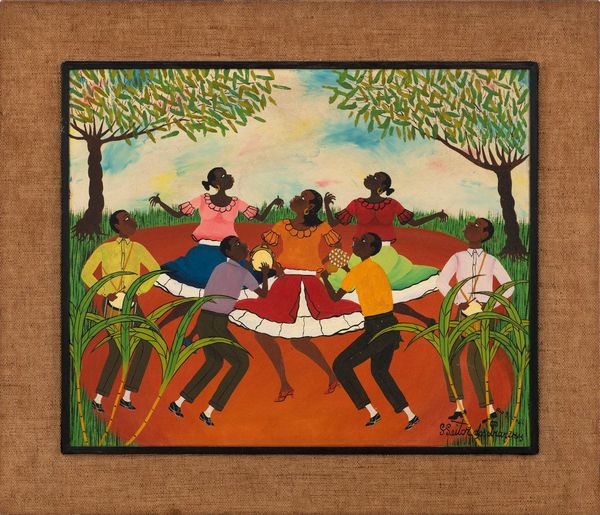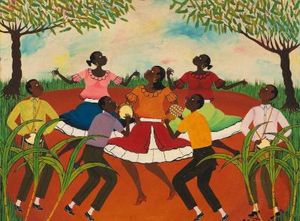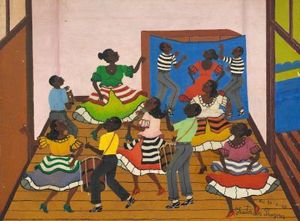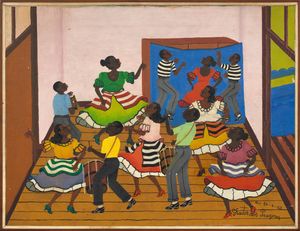Heitor dos Prazeres was a visual artist, costume designer, composer and samba singer, known as a key figure in the cultural context of Rio in the early twentieth century. Born in 1898, shortly after the abolition of slavery, Heitor dos Prazeres created a body of work informed by Afro-diasporic culture and African religiosity. At the same time, he experienced transits between social strata and diverse artistic experiences.
Considered a multi-artist, Heitor knew how to work across various media, and at the height of his career in painting, he even maintained a studio in which he had several assistants. His craft was, in this sense, a shared practice, but he was responsible for drawing up the compositions and the main choices of gestures, as well as detailing the figures represented.
Prazeres was self-taught, and his entry into Rio's artistic milieu was initially through music. He was born into a family deeply connected to music: his father was a clarinetist and his uncle Hilário Jovino Ferreira was one of the first generation of urban samba musicians. From a young age, he lived with musicians such as Donga, João da Baiana, Sinhô, Caninha, Pixinguinha and Paulo da Portela, who often visited the home of his aunts, Ciata and Esther. In the 1930s, he formed the Grupo Carioca and became a rhythm player for Rádio Nacional and Cassino da Urca. His most popular songs and compositions were: Cantar para Não Chorar, with Paulo Portela; Carioca Boêmio, Consideração, composed in partnership with Cartola and Pierrot Apaixonado, with Noel Rosa.
In the second half of the 1930s, he also began to dedicate himself to painting, dealing with themes related to Brazilian popular culture and traditions and scenes from the daily lives of the city's black population. Samba, carnival, urban landscapes and children's games were his most frequent themes, and he also consistently focused on the religious traditions of Candomblé and Umbanda.
Heitor dos Prazeres' paintings demonstrate his attention to detail, his ingenious observation of his cultural context, and the artist's propensity to devote himself to minutiae and subtleties. This is conveyed, for example, in the pictorial quality of the clothes, hats, jewelry and other adornments of his characters, represented with remarkable skill and detail. These elements contributed to attributing great dignity to those portrayed - in a context of intense social hostility. He even depicted himself in several of his works, and some of his characters were people he knew and respected in the neighborhood between Cidade Nova and Cais do Porto in Rio de Janeiro, known as "Little Africa". Heitor do Prazeres himself made a decisive contribution to making this region known as one of the most effervescent spaces of Afro-diasporic creativity.
His first canvases were produced in 1937. In 1951, he won third place in the award for national artists at the 1st International Biennial of São Paulo, with the painting Moenda, which is now part of the collection of the Museu de Arte Contemporânea da USP. He had a gallery dedicated to his work (Sala Especial) at the 2nd São Paulo International Biennial in 1953 and took part in the 1961 and 1979 editions. In 1966, he took part in the First World Festival of Black Arts in Dakar, Senegal. He created sets and costumes for the Ballet of the IV Centenary of the City of São Paulo. In 1999, a retrospective exhibition of his work was held at Espaço BNDES and the National Museum of Fine Arts (MNBA) in honor of his centenary. In 2023, a major retrospective of his work was presented at the CCBB in Rio de Janeiro. Throughout his career, he has held six solo exhibitions and more than thirty group shows.






